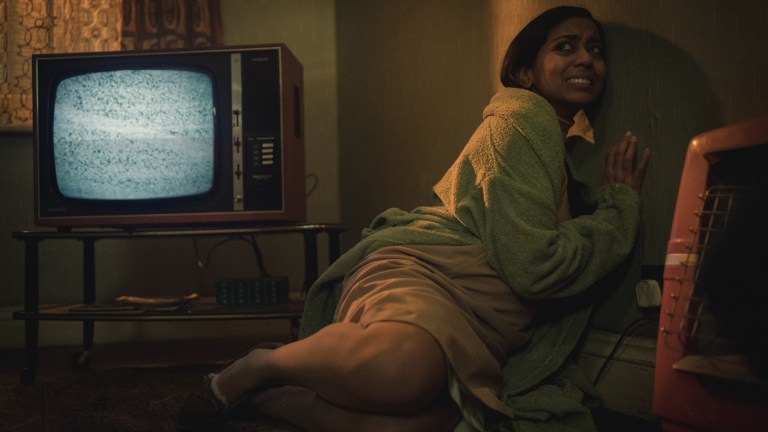Why Black Mirror Season 6 Feels Like an Entirely New Show
Black Mirror season 6 is quite different from any other. And according to creator Charlie Brooker, there's a good reason for that.

This article contains no spoilers for Black Mirror season 6.
Speaking to Den of Geek shortly before the long-awaited sixth season premiere of his sci-fi anthology series Black Mirror, creator and writer Charlie Brooker owned up to having some opening night jitters.
“It’s quite different in many ways, which means it’s much more unpredictable,” Brooker says of Black Mirror season 6. “Hopefully, the psychological landscape of it is traditionally Black Mirror, even if it sort of shakes up what the rules are. But I don’t know. It’s scary because you just don’t know how people will react.”
No two episodes of Black Mirror are the same. That comes with the territory of anthology storytelling. But ever since Channel 4 premiered series opener “The National Anthem” in 2011, Black Mirror installments have traditionally followed certain rules, formats, and traditions – even as the series moved to Netflix starting with its third season. Taking their cue from the series’ name (a “black mirror” is what we all see dozens of times a day in the blissfully quiet moment before our screens turn on), Black Mirror stories tend to be about technology, human beings, and the increasingly dystopian ways the two intersect
With season 6, however, Brooker chose not to be bound by the usual Black Mirror rules he himself had established.
“When Black Mirror started, the weren’t many other shows like it,” Brooker says. “Now there are quite a lot of shows where everyone’s surrounded by screens, chrome, and glass, and everyone’s weeping and going, ‘Oh my God, help! Oh, oh, I live in a computer!’ I was aware that the show was maybe starting to be seen as a ‘technological-horror-story-of-the-week’ type thing. So it was interesting for me to go ‘right, I’m gonna rip up that rulebook and see what happens.’”
Black Mirror season 6 at times feels like a whole new show. And that’s because it almost was. Fans may have noticed that in the Black Mirror season 6 trailer, final episode “Demon 79” was introduced as a “Red Mirror” production. Initially for Brooker, Red Mirror wasn’t just a part of Black Mirror‘s sixth season but a separate storytelling entity entirely.
“It was a bit of a palate cleanser. Red Mirror was going to be a companion series to Black Mirror,” Brooker explains. “It means I’m doing something that feels like Black Mirror, but it’s not necessarily bound by the rules of Black Mirror: like it’s got to be about technology, be dystopian, and set in the near future.”
Brooker found the experience of discarding Black Mirror‘s usual rules for Demon 79 so refreshing that he opted to just continue to do so when writing the season’s remaining four episodes.
“That opens you up to a new style of storytelling. So by the time you get something like ‘Beyond the Sea,’ which is much more classically Black Mirror premise, I’m thinking ‘what if I set it in the past, and then that makes it much more fresh?’
Of the five stories presented in season 6, three take place in the past and one (we won’t spoil which) contains so many overt supernatural elements that Brooker contemplated keeping Demon 79’s Red Mirror branding in place for it. Interestingly, Brooker wrote this season in the reverse order that it ended up in on Netflix, beginning with the divergent Demon 79 and concluding with the more familiar “Joan Is Awful.”
“Weirdly, the series got more Black Mirror as it went along,” Brooker observes.
Perhaps Brooker’s comfort in returning to the tried and true Black Mirror formula as he wrote the season suggests that the concept is stickier than he realized and future seasons of the show will resemble the Black Mirror of old. But if the quality of Demon 79 is any indication than Red Mirror is here to stay. Hell, let’s hope future seasons add even more colors. Imagine the environmental horror of a Green Mirror.
All five episodes of Black Mirror season 6 are available to stream on Netflix now.
